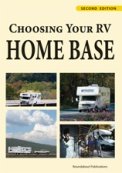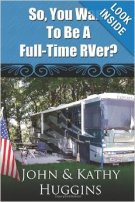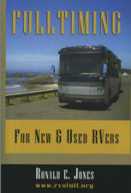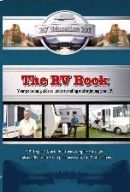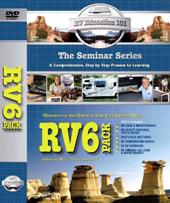Ever Wonder about RV Fulltiming?
Fulltiming refers to a subset of RVers who live and travel full time in their RV. Normally, these Rvers do not have a traditional house (sometimes called a “stick” house).
Purists may define fulltiming in a strict sense – to mean no house, condo, RV lot or any other physical roost to return to. Others allow that if someone is living and traveling in their RV most of the year, they are fulltimers.
Fulltiming Considerations
Like most RVers, we don’t get too fussy about the definitions. If someone thinks of themselves as fulltimers, that’s okay with us.
In our case, our only home is the RV. Like a turtle, our home goes with us. All of our possessions are stored on board – in interior cabinets, exterior bays or our tow car.
Yet the fulltiming RVer also deals with aspects unique to their particular type of RV lifestyle. We think it is a great way to live, but it is not for everyone and is not a decision to be taken lightly.
Here are a few considerations:
Getting rid of a house and personal belongings can be emotional, to say nothing of the logistics. What to keep, what to give away, what to do with the rest?
We gave away a lot of stuff to friends and family, had a garage sale, donated items and took with us what we figured we would need on the road.
Close family ties. People accustomed to frequent visits with family and friends need to consider how they will adjust, and how they will stay connected from across the miles. Some people find it difficult to leave a physical community or geography. On the other hand, we have met RVers who delight in their RV lifestyle as the perfect way to visit with friends and family geographically scattered around the country.
How to stay connected in general is a consideration. Mail, email, webcams, RV internet access, cell phones. Fulltiming RVers deal with these in different ways, and take advantage of new technology, which makes it much easier to stay connected while fulltiming.
Space: Less of it for things. We can often find yet another niche to stash yet another thing into our motorhome. But make no bones about it – it’s a big
change from the land of walk-in closets, basement shelves and “room in the garage”. That said, some important appliances like the best air purifier still stay with us.
Space – less of it for you. Less personal space and privacy. People living together fulltime in an RV need to be able to get along. They will be together more often and in much closer quarters than traditional living.
Costs. Fulltiming RVers need to plan what it will cost them to live a fulltime lifestyle. This means budgeting for day-to-day living expenses on the road, as well as planning for the future.
The traditional house is an appreciating asset. The typical RV depreciates over time.
Money may be needed to replace or upgrade an RV. Or the fulltimer may want to plan for a time when they travel less frequently and also maintain a more traditional home.
Jobs. The fulltimer may want to consider working on the road to supplement income. There are lots of options available. As you ponder the choices, think about what impact working will have on your planned fulltiming lifestyle.
After a couple years of just traveling and sightseeing, we started workamping to help pay the bills and to keep active.
Some jobs require a commitment of time in one location. Others can be taken on the road. What types of RVer jobs merit consideration?
Establishing an RV home base.
Fulltimers still need a home base for a variety of reasons including voting, medical coverage, insurance, taxes, drivers’ licenses, etc.
This RV Home base book provides some idea of the types of tax and related costs in each state. Once you have some familiarity with what to look for and perhaps have narrowed down some potential states, it is always a good idea to check the latest information.
Read, Read, Read…
When we first became intrigued by the thought of fulltiming, we started reading. We read books that dealt with RV living, and fulltimer experiences. We read books that not only educated us – they inspired us!
We got different perspectives and ideas.
We think this kind of reading and research is a MUST for
anyone pondering RV living on a fulltime (or even most-of-the-time) basis. Whether you choose to be a fulltimer or not, the learning is sure to help you create and refine your RV lifestyle. So here are some recommended resources on the subject.
|
Retire to an RV: The Roadmap to Affordable Retirement provides you with exactly the right information to decide if fulltiming is for you. RV Lifestyle experts Jaimie Hall Bruzenak and Alice Zyetz, share their combined knowledge based on 17 years on the road and five previous books. Plus 41 solo and couple RVers share their real-life experiences. We love the different perspectives – very important for making the decision! |
|
|
So, You Want to be a Full-Time RVer? Advice based on real experience. This is great resource for doing the initial homework and dreaming, to choosing the right RV for you, to the purchase, camping and lots of stuff in between. This comprehensive guide covers all the things you wonder about and is a must read for anyone considering the fulltime lifestyle. |
|
|
Fulltiming For New & Used RVers If you are thinking about hitting the road full-time in a recreational vehicle, then this book should be essential reading. A very comprehensive guide to full-time RVing. This is a well-organized, easy-to-read book written by a veteran RVer |
|
This well-known RV book by an expert provides techniques and ideas on how to You’ll find budget planning tips, workamping insights and hundreds of ways to earn money as Lots of valuable information and ideas to make the RV lifestyle financially possible for you. |
|
This comprehensive book covers all aspects of RV ownership; from Author Mark Polk is widely recognized for his technical expertise – everything you need to know. Get it in print, Kindle or pdf format. |
|
10-Minute Tech: Popular book filled with A popular choice to learn what you need to know regarding a variety of RVing operating systems, common problems and handy solutions. |
|
RV DVDs and Downloads For a great way to really learn and remember the “how to’s” of RVing, we highly recommend the wide variety of RV videos. Essential visual instruction when starting out, and a great refresher for everyone. There are titles that cover the electrical and plumbing systems, |
Full Time RV Living Tips
There are a great many people in the world who love to take their RV’s out and enjoy a weekend or holiday away from home. It is a welcome change from their normal everyday grind to get out, enjoy different places, and still have most of the amenities of home.
However, there are many people who actually RV full time. The RV is their home and they wouldn’t have it any other way. Living full time in an RV gives you the luxury of moving about, as you wish, going anywhere you want and usually, for as long as you’d like.
For those who are considering taking on the RV lifestyle full time, there are a few things worth considering. We have put together a list of 17 tips for the full time RV enthusiast.
1. Try it out first. This is probably the most important tip for anyone considering RVing full time. You may have spent several weekends out already in your RV, and you may even have had a few weeklong trips. These have put you in the mindset that you would like to RV full time. However, you need to have several of these behind you before you’re ready to give up your home in lieu of the open road. Ask yourself how you’ll feel not having a place to return to, no place to unpack and no place to call a “home base”. At first thought, it may not seem like that big of a deal, but it’s not a mistake you want to make without plenty of forethought and practice.
2. Consider what kind of RV life you want to have. Do you want to be on the road all the time or do you want to set up in one spot for a longer period of time? You might want to set up in one place for a week, then move on to the next place. On the other hand, you might consider finding a spot that would let you stay for an entire month. Are you more comfortable in a secluded area, or do you prefer neighbors and community activities that you can take part in? These are all facets you will want to consider before embarking on your journey.
3. How big does your rig need to be? Another major facet of the full time RV life is the size of your RV. You need to be truthful with yourself in considering how much room you want and need for the lifestyle you’re going to be undertaking. If you have little in the way of belongings and you don’t look to acquire very much in your travels, a smaller rig or pull behind might be right for you. It’s also a good choice if you know you’re going to be spending a lot of time in the more remote campsites where maneuverability will be an issue. On the other hand, if you are going to be making use of bigger sites, spending more time in one spot and don’t want to give up a great deal of your belongings, bigger will be better.
4. Be comfortable with minimalist living. If ever there was a lifestyle that demanded a downsizing of material possessions, full time RV living is definitely it. You must be able to decide exactly which clothing items you can’t live without and get rid of the rest. The same goes for furniture, dishes, electronic gadgets, hobby items and a lot more. You could have a yard sale to get rid of the excess. You could sell on eBay or give items away to charity or friends and family. You might even decide that you’re not ready to completely rid yourself of everything and put some items in storage. However, if the latter holds true, then it could be possible that you aren’t truly ready for a full time RV lifestyle.
5. You should have a bit of DIY knowledge. You don’t exactly have to be a mechanic or a plumber or and electrician, but a little knowledge in all of those fields will be helpful for this lifestyle. This is especially the case if you will be moving often and putting a lot of miles on the RV. There is more maintenance involved with an RV than a regular home. Therefore, it would be best to get to know your owner’s manual and what it suggests. Basic plumbing and electrical knowledge will go a long way, as will knowing what to do if your roof or windowsills leak. It is also a good idea to have a maintenance routine that you go through on a set schedule.
6. Insurance is a big deal, so make sure you have it. However, don’t just go with the first policy you come across. This is where it’s best to do a bit of homework, as there are many different options with many different policy payouts and a lot of fine print. There are also some discounts and other options you will want to familiarize yourself with before making a final decision. You will need to types of coverage if something happens to your RV. One type of policy covers the RV itself in the case of damages or theft, and another for personal belongings, much like homeowners or renters insurance. Consider what type of lifestyle you’ll be living, for the most part, and what types of problems you might run across. There is also a medical insurance just for full time RV’ers.
7. Being thrifty should become second nature. Unless you’ve won the lottery or have a handsome retirement package, you can definitely benefit from making every dollar stretch to its maximum potential. Before you embark on this lifestyle, you should make a habit of logging every dollar spent to see exactly where your money is going, and for what. Doing this allows you to see where cuts can be made and where it might benefit you to stock up on certain things that you buy often. A good rule of thumb is to check with other RVers who already live this lifestyle and ask for their input on this matter. Everyone has their own favorite tips and solutions so be prepared to take notes.
8. Making money on the road is certainly not impossible. There are many parks and campgrounds at which you can work, but these aren’t your only options. Research the area where you are going for opportunities that fit your skill set. Once you have something in mind, prepare a resume and a nice reference list to have on hand that accentuates those skills and make stops throughout the area inquiring as to seasonal or temporary openings.
9. Technological connections can be very important. This is especially true if you are leaving behind friends or family that you really want to stay in touch with. Luckily, WiFi is becoming more and more prevalent all around the country, so it’s never been easier to connect. There are many other options to consider as well, including getting your very own wifi hotspot to carry with you. Many full time RVers also have satellite dishes hardwired right into their rig for easy access. Another important topic to research before deciding to leave, so you don’t wind up being stuck with no way to connect.
10. Establishing a permanent legal residence is an absolute must. While you may be planning to be on the road for 11 months and 29 days of every year, there are still very important reasons to have a permanent legal address. You have to consider things like your driver’s license, tax information, bank accounts and voting privileges. There is also the matter of mail forwarding, insurance rates and possibly vehicle inspections. While there are as many different sets of rules as there are states, the most friendly domicile states are South Dakota, Texas and Florida. Again, you will want to do your homework before leaving.
11. Keep travel resources at hand. Many RV lifestyles revolve around moving with the weather, to warmer or cooler places, and you certainly want to stay in the know. If you are planning to vacation on the coast, but find that a hurricane or tropical storm is blowing in and causing trouble, you may want to change your plans. Nothing is worse than trying to maneuver in bad weather or a wet campground. You also don’t want to put yourself in harm’s way and risk damage to your RV in such situations as tornadoes, floods or excessive mud. Try to stay current and well informed about these issues and have a special weather radio if possible.
12. Consider how many people will be with you. Many people who RV full time are married couples who have retired. However, there is an ever-increasing population of couples with families who are hitting the road. Regarding the latter, you need to keep in mind that in addition to having less space for belongings, there is also less space for privacy. Learning to live together, and get along, is an absolute necessity and if that isn’t possible, it’s time to rethink your decision. One way around this is to make sure your rig is big enough to assign certain areas for certain children and their belongings, off limits to siblings. That personal space can mean the world to some people.
13. If you have children, you will have to plan for their education. They will have to be homeschooled with the only difference being that their home is on wheels. There are a lot of different online curriculums and education resources to take advantage of and they vary in pricing from free and up. This will take a bit of research, but keep in mind, as well, that life on the road will afford a great many educational opportunities. You will be able to actually visit and teach from sites that many will only ever read about or see in videos or pictures.
14. Make a commitment to eating healthy. It can be all too easy to just stop in at the nearest fast food restaurant and grab something to go, but that certainly isn’t the healthiest option. You will need a well-rounded diet more on the road than anywhere else, so it would be best to make a plan for such a diet. There are many places where finding fresh fruits and veggies isn’t easy, so stock up when and where you can. Use stay-fresh bags to store these items in and learn to can these items as well for longer storage possibilities.
15. Remember to factor in exercise. Living life in an RV can lead to a very dormant lifestyle if you’re not careful. A lot of time is spent traveling, sitting and being confined to one particular area for, sometimes, long periods. When at all possible, plan your stay where there is access to hiking and biking trails, swimming and other physical activities. It can even be considered exercise if you take a nice long stroll around your campsite. There are plenty opportunities for physical exercise with a life on the road, you just have plan ahead and look for opportunities.
16. Make sure to have plenty of on-the-road activities available while traveling. Considering the fact that internet access may be intermittent, you will want to make sure you have some of your favorite DVD’s, cd’s and books at arms reach. Portable DVD players are a necessity with children in the RV and you will probably benefit greatly from an e-reader of some sort. If you have a laptop or tablet, these can easily be downloaded and there is a plethora of places to find free reading material.
17. Ditch the electronics and have some old fashioned fun. Teach your kids how to play various card games and board games, or learn a new one for yourself. There are a great deal of hobbies, as well, that do not require electronic gadgets including cross stitch, crocheting, drawing, photography, jewelry making, wood carving and many more. There are also hobbies that can be taken advantage of at the campsites as well including bird watching and identifying plants, trees and insects.
Some helpful articles for fulltimers:
- More great reading on the RV Lifestyle
- Boondocking Tips from our Travels
- First Workamping Job
- This “N That – Reminders for the Road
- Places to RV
- RVer Jobs
- Fulltimer Expenses
- RV Costs
- Winter Un-Wonderland
- Everyday Misadventures
- How to Sanitize RV System
- A new Supplemental Brake System
- Membership campgrounds
- RV Service
- Motorhome versus Fifth Wheel
- Things We Like & Don’t Like in Motorhome Living
- Frequently Asked Questions
Browse around this site for more helpful information on fulltiming and the RV lifestyle in general.
We cover a wide variety of topics to help address common questions. We also welcome input from other RVers.
To be informed of new updates to our site and more RV lifestyle ideas, be sure to subscribe to RV Days

Jill Miller is the founder of Your RV Lifestyle. Trading corporate America for the open road, Jill, along with her partner Jose, began their RV journey, making an unconventional start by wintering in New Jersey. A natural adventurer, she was motivated by a desire to explore the USA and beyond, embracing the varied landscapes, communities, and cultures across the country.
For Jill, the allure of RV living was not about material accumulation, but rather the pursuit of an adventurous, fulfilling lifestyle. A lover of golf, bicycling, hiking, and line dancing, she has carried her passions across the country, engaging with them in diverse settings. Jill’s commitment to the RV lifestyle came after years of careful research, numerous consultations with RV owners, and personal trials, including living in a rental RV.
